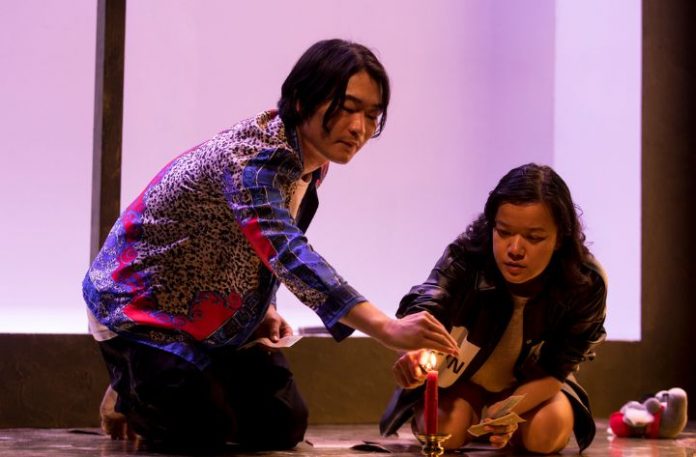Golden Blood
Writer: Merlynn Tong
Director: Tessa Leong
SBW Stables Theatre
June 29 – July 30, 2022
Merlynn Tong’s long anticipated Golden Blood is an enthralling 90 minutes of theatre superbly performed by two spellbinding actors. While often immensely funny, it is at the same time deeply disturbing, pervaded by a sense of dread underscored by very clever staging.
Set in Singapore, and within a Chinese community, we are invited into the life of an already fatherless 14-year-old girl (a vulnerable and appealing Merlynn Tong) after the suicide of her mother. We piece together a closed world where a young girl has been the only company for her depressed and alcoholic mother as they inhabit a once expensive and now decaying apartment. Joss papers have been burned, relatives have come and gone taking with them anything left of value, an official has delivered a government form about guardianship she doesn’t understand with appropriate cliches, and her only comfort is the promise her mother made her of “an inheritance”.
Her “inheritance” is complex. Clutching her tourist-ware toy koala, she absorbs the reappearance of a 21-year-old brother (a colourful Charles Wu) whom she hasn’t seen for years. His ebullient, blustering manner contrasts with her often incisive but uncertain responses. For instance, when he opts for the role of guardian she observes, “I don’t think you are up for this” and “Won’t I be a burden?” She might prefer another contender, an Uncle Yap who has the “perfect nuclear family”, but her brother overrides her with, “We have to stick together/Stay in our family home.” He is a gangster, a genuine one, and it’s not “just a hobby” as his sister had surmised. We might wonder about his desire to protect his sister as property seems to be the key word and not family.
His sister has a special affection for marsupials (an animal that carries its young in a pouch and often continues to suckle them for up to a year). She longs to go to Australia, which she identifies as a more nurturing environment. Her mother visited Australia with her brother but, when the opportunity arises through a university place, her brother dissuades her by appealing to family, “Stay here and get rich … Let’s start building our legacy.” However, herein lies the problematic inheritance. He wants to restore the former wealth possessed by his father but the “inheritance” his father has passed onto him is the way of violence – the parang (dagger) and the only way of being a family he knows is through making money together – “golden blood”. How will they escape the destructive legacy of the past?
The stage floor gleams golden suggesting how fundamental the acquisition of wealth is to self and community respect. The signalling of the age of the two characters charts their descent into a more and more chaotic world and gives a sense of the pressure they both are under. The use of a rectangle of light to highlight the eyes of the girl as her age changes and the expressiveness of those eyes – desperate, frantic – gives an element of true horror to a narrative that could have been one of despair.
While some of the cultural preoccupations may seem unfamiliar and intriguing, the obsession with material wealth – excessive wealth – is becoming all too familiar in our own corporatised world. Is Australia the place we once imagined it to be? Golden Blood makes an important contribution to assessing our future direction.






